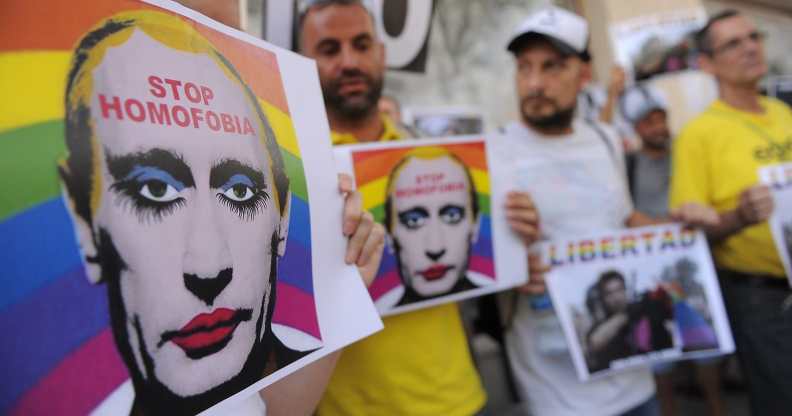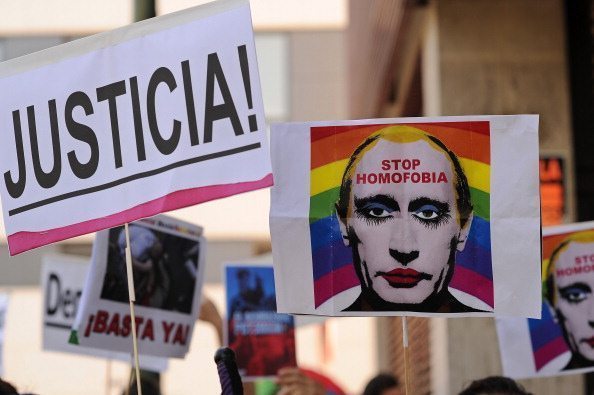Russia bans ‘extremist’ picture of Putin wearing makeup

The Russian government has added a picture of the country’s President Vladimir Putin photoshopped wearing makeup to a registry of prohibited “extremist” content.
The much-distributed picture has circulated widely on the internet and at LGBT rights protests, seeking to resist the country’s ‘gay propaganda’ law by lampooning Putin’s macho image.
This week, Russia’s Justice Ministry quietly designated the image as ‘extremist’ material, employing the government’s supposed anti-terrorism powers to ban it from being circulated or displayed in Russia.
The image was added to the index of banned extremist materials – making it the 4,071st item to be banned in the country under the supposed anti-extremism powers.

According to the Moscow Times, the decision to ban the image reflects a May 2016 court ruling, when a man was charged with “hate speech” offences after posting the picture of Putin in makeup on Russian social network Vkontakte.
The Justice Ministry listing describes the image as a “poster depicting a man resembling the president of the Russian Federation Vladimir Putin, with makeup on his face – painted eyelashes and lips [intended to] serve as a hint at the alleged nonstandard sexual orientation of the President.”
Homophobia has surged in Russia since the passage of 2013’s so-called ‘gay propaganda’ law, which has been exploited by anti-LGBT forces in law enforcement and government in order to clamp down on the LGBT community.
Some reports have suggested that vigilante attacks and hate crimes against LGBT people are on the rise in the country.
The Russian government recently warned citizens to refrain from homophobic attacks while on holiday in other countries.
The Foreign Ministery guidelines, which are aimed at preventing Russian tourists from causing offence, warns them that they may see “people of non-traditional sexual orientations” while on holiday in Europe and the Americas.
The guidance for visiting France warns that in some countries it is advisable “not to speak or act abusively to members of the LGBT community”.
Advice for Russians heading to Spain warns: “Public expression of negative attitudes towards persons with different sexual orientation are not met with understanding in others, so you should refrain from it.”
The entry for Canada includes the longest warning.
The travel advice warns that “there is a serious fixation on sexual equality” in Canada, “which has long legalised same-sex marriage”.
It cautions Russians against telling homophobic jokes, noting that “in addition to public condemnation, in urban areas with many sexual minorities (particularly Vancouver, Toronto and Montreal) there is a risk of punishment in the form of fines or being charged with ‘hate crimes’.”
Russia last month rated the new Power Rangers reboot for aged 18 and over over a lesbian storyline.
The reboot of the 90s TV show and film series sees one of the five main characters struggle with her relationship with another girl in the film’s second act.
Trini, the Yellow Ranger, eventually comes to terms with her sexual orientation and is accepted by all the other characters, said director Dean Israelite.
Russia in 2013 passed an anti-gay bill which bans the ‘promotion of non-traditional sexual relations’ to minors.
Meanwhile, Malaysia is to show the new Power Rangers film in full despite the lesbian storyline.
This comes after the country backed down when Disney banned the Beauty in the Beast film there when censors cut out a gay moment.
Last month, Disney barred the film from being shown by any cinema in the country after it found out censors had removed the moment where Gaston’s sidekick LeFou dances with a man.
The live-action remake is the first major Disney film to feature an unambiguously gay character, and smashed box office records despite an attempted evangelical boycott.

